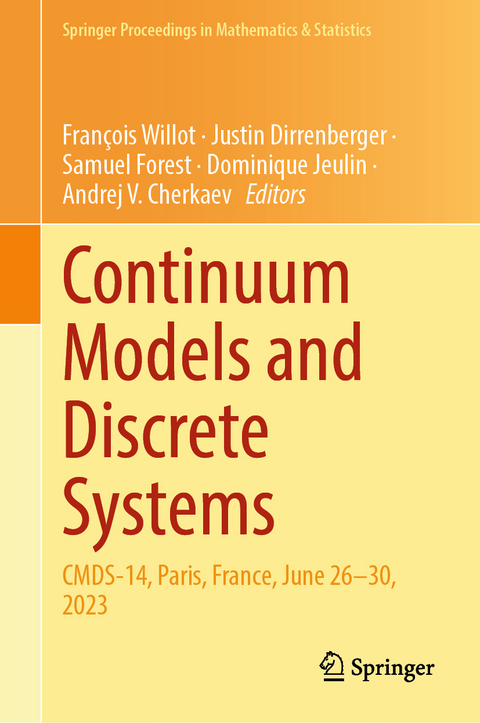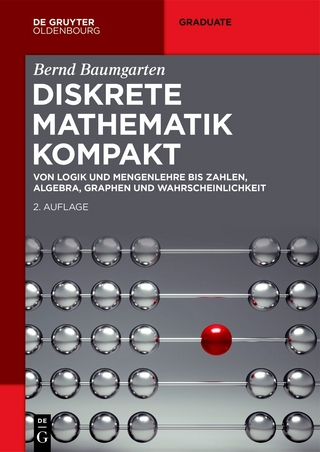
Continuum Models and Discrete Systems
Springer International Publishing (Verlag)
978-3-031-58664-4 (ISBN)
The present book contains the proceedings of the 14th International Symposium on Continuum Models and Discrete Systems (CMDS14) held in Paris in June 2023. It contains 21 contributions that cover a broad range of topics in the wide field of mechanics and physics of heterogeneous media for discrete and continuous systems, from image analysis to models of random structures and to homogenization. The sessions in the CMDS conference series cover, in particular, the modeling of complex heterogeneous systems and metamaterials, structures and composites with extreme properties, deformable solids with microstructures, generalized continua, fracture and defect dynamics, fatigue, design of structured and architectured materials, micro and nanostructures, thermodynamics, transport theory and multiphysics coupling and methods ranging from homogenization theories to optimal design and machine-learning frameworks. Papers in the present volume are organized according to the following six main topics: probabilistic models, homogenization, solid mechanics, architectured materials, optics and metamaterials, machine learning methods.
F. Willot, J. Dirrenberger, A. Cherkaev, S. Forest, D. Jeulin, Proceedings of the 14th International Symposium on Continuum Models and Discrete Systems.- C. Soize, Probabilistic learning inference constrained by an uncertain model and a target: A general method with application to elasticity homogenization without scale separation.- M. Ostoja-Starzewski, Tensor Random Fields.- C. Lantuéjoul, X. Freulon, A. Krivcenko and M. Pereira, Continuous simulation of heterogeneous media: The Karhunen-Loève approach versus the turning bands method.- L. Moutin, C. Duguay, L. Fayette, A. King, R. Masson and M. Bornert, Morphological models of networks of inter-granules micropores: identification and validation based on 2D and 3D imaging.- L. L. Bonilla, Collective motion of epithelial cells in tissues and the active vertex model.- A. Cherkaev, Structure of fields in extremal 2D conducting multimaterial composites.- L. M. Fernandes, P. Rieder, M. Neumann, A. Mulard, H. Proudhon, V. Schmidt and F. Willot, Effect of crystallographic twins on the elastoplastic response of polycrystals.- F. Ongaro, K. Mathis, F. Masson and J. Dirrenberger, Continuum modelling of orthotropic hexatruss lattice materials: effective stiffness and experimental validation.- D. Philippe, B. Vieille and F. Barbe, Experimental characterization and numerical modeling of the porosity formation mechanisms in thermoplastic laminates at high temperature.- K. Sab and J. Bleyer, An Adaptive Version of the Eyre-Milton Solution Scheme for FFT-based Homogenization of Composites.- H. Askes, M. Lombardo and Duc C.D. Nguyen, A stabilised micropolar theory derived from a periodic beam lattice.- A. Kandiah, Ian S. Jones, N. V. Movchan and A. B. Movchan, Interaction between gravity and gyroscopic forces: transient control of gyropendulums and inverted gyropendulums.- E. Kogan, On the kinks, the solitons and the shocks in discrete nonlinear transmission line.- Y. M. Strelniker and D. J. Bergman, Manipulation of the optical properties of a plasmonic metamaterial film by an external transverse voltage.- A. Acharya, Variational principle for a damped, quadratically interacting particle chain with nonconservative forcing.- A. Leichner, H. Andrä, T. Palmer, F. Wenz and C. Eberl, Optimal Design of Programmable Mechanical Metamaterials.- Amy Novick-Cohen, D. Goldberg, K. Golubkov and R. Tarabeh, Modeling multi-grain multi-hole thin solid state films.- M. Mohammadi, S. Velasco-Forero, F. Willot, M. Sangalli and J. Angulo, Choquet Capacity networks for random point process classification and regression.- K. Schladitz, C. Redenbach, T. Barisin, C. Jung, N. Jeziorski, L. Bosnar, J. Fulir and P. Gospodnetic, Simulation of microstructures and machine learning.- I. M. Gitman, R. Tu and L. Susmel, Fuzzy inference system for fatigue parameters prediction in metals: from strength to fatigue.- S. Kushwaha, J. He, D. Abueidda and I. Jasiuk, Using neural networks to explore structure-property relations in bio-inspired impact-resistant structures.
| Erscheinungsdatum | 25.09.2024 |
|---|---|
| Reihe/Serie | Springer Proceedings in Mathematics & Statistics |
| Zusatzinfo | XI, 284 p. 117 illus., 94 illus. in color. |
| Verlagsort | Cham |
| Sprache | englisch |
| Maße | 155 x 235 mm |
| Themenwelt | Mathematik / Informatik ► Mathematik |
| Technik ► Maschinenbau | |
| Schlagworte | complex microstructures • conference proceedings • Continuum Mechanics • homogenization • Research |
| ISBN-10 | 3-031-58664-6 / 3031586646 |
| ISBN-13 | 978-3-031-58664-4 / 9783031586644 |
| Zustand | Neuware |
| Haben Sie eine Frage zum Produkt? |
aus dem Bereich


